
French postcard by Cinémagazine-Edition, Paris, no. 663. Photo: Metro-Goldwyn-Mayer. Joan Crawford and Robert Montgomery in Untamed (Jack Conway, 1929). Collection: Geoffrey Donaldson Institute.
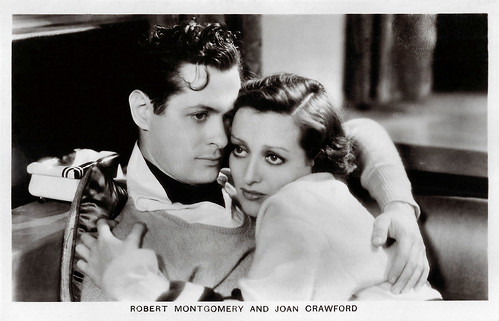
British postcard in the Film Partners Series, London, no. P 47. Photo: Metro Goldwyn Mayer. Robert Montgomery and Joan Crawford in Our Blushing Brides (1930).
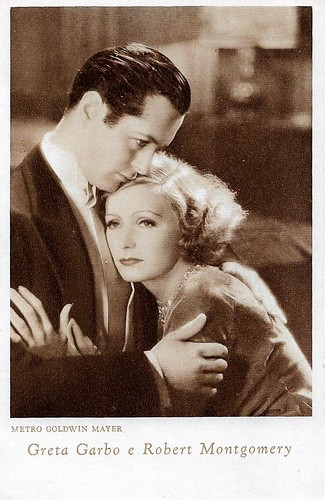
Italian postcard by Cinema-Illustrazione, Milano, Series 2, no. 3. Photo: Metro-Goldwyn-Mayer. Greta Garbo and Robert Montgomery in Inspiration (Clarence Brown, 1931).

Dutch postcard, no. 475. Photo: M.G.M. (Metro Goldwyn Mayer). Robert Montgomery and Tallulah Bankhead in Faithless (Harry Beaumont, 1932).
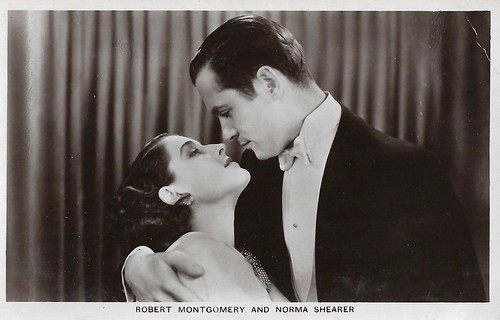
British postcard in the Film Partners series, London, no. P27. Robert Montgomery and Norma Shearer in Riptide (Edmund Goulding, 1934).
A screwball comedy by Alfred Hitchcock
Robert Montgomery was born Henry Montgomery Jr., in Beacon, New York, in 1904. He grew up very wealthy as the son of a New York businessman, the president of the New York Rubber Company. After his father's death, there was nothing left of the fortune for him, so he had to eke out a living with odd jobs.
He tried unsuccessfully as a writer and then also as an actor. The director George Cukor discovered him for the stage and Cukor gave him an entry to Hollywood and a contract with Metro-Goldwyn-Mayer. His first film for MGM was the comedy So This Is College (Sam Wood, 1929). He had his breakthrough as the weak-willed prisoner Kent in The Big House (George Hill, 1930).
The studio purposefully built him up as a star and Montgomery quickly played alongside established female stars. He appeared as Greta Garbo's romantic interest in Inspiration (Clarence Brown, 1930). Norma Shearer cast him opposite her in The Divorcee (Robert Z. Leonard, 1930), Strangers May Kiss (George Fitzmaurice, 1931), and Private Lives (Sidney Franklin, 1931).
Montgomery appeared in the first filmed version of When Ladies Meet (1933), which starred Ann Harding and Myrna Loy. He made a total of six films with Joan Crawford, beginning with Untamed. In 1937, she starred opposite Marion Davies in Ever Since Eve, based on a play by the then-fashionable playwright Lawrence Riley.
He was often cast in charming and comedic roles, for example in the Alfred Hitchcock-directed screwball comedy Mr. and Mrs. Smith (1941) opposite Carole Lombard. Very successfully going against his usual type of role, he was cast as a psychopathic murderer in the thriller Night Must Fall (Richard Thorpe, 1937), for which he received the first of his two Oscar nominations. The second was for Here Comes Mr. Jordan (Alexander Hall, 1942) in which he played a boxer who is accidentally taken to heaven by an angel and reclaims his lost lifetime.
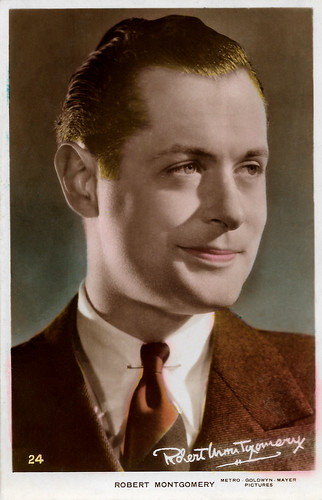
British Art Photo postcard, no. 24. Photo: Metro Goldwyn Mayer.

British postcard
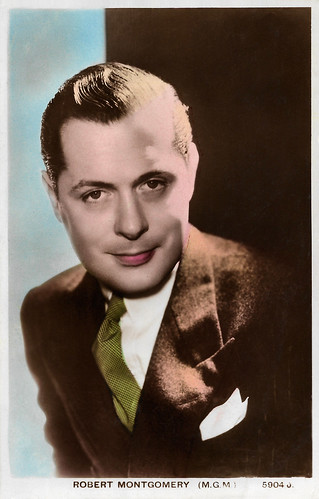
British postcard by Valentine's, no. 5904O. Photo: Metro-Goldwyn-Mayer Pictures.

British postcard by De Reszke Cigarettes, no. 5. Photo: Metro-Goldwyn-Mayer (MGM).
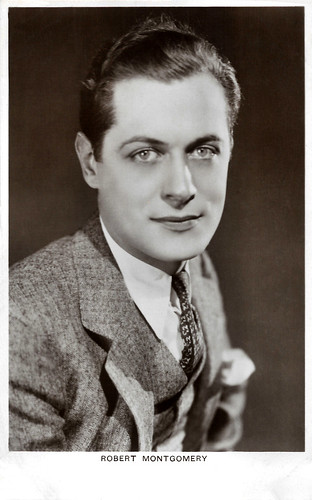
British postcard in the Picturegoer Series, London, no. 461.
An experimental Film Noir
Robert Montgomery's association with MGM lasted 16 years, interrupted only by the Second World War. After the U.S. entered World War II in December 1941, he joined the US Navy, rising to the rank of major. After his return from active service Robert Montgomery also began to work as a director.
He made his directorial debut, but without credits, in They Were Expendable (John Ford, 1945), where he directed some of the PT Boat scenes when director John Ford was unable to work for health reasons. His best-known film as a director is The Lady in the Lake (1947), an experimental Film Noir shot entirely from the hero's perspective with a subjective camera.
Active in Republican politics and concerned about communist influence in the entertainment industry, he was a friendly witness before the Committee on Un-American Activities in 1947. Montgomery was one of the first Hollywood stars to move to television. He hosted the Emmy Award-winning television series, Robert Montgomery Presents. The series, produced between 1950 and 1957, proved very popular.
The Gallant Hours (1960), a film Montgomery directed and co-produced with its star, his friend James Cagney, was the last film or television production he worked on. Montgomery served as president of the Screen Actors Guild from 1935 to 1938 and again from 1946 to 1947. The actor was active in the Republican Party throughout his life, supporting Republican presidential candidates Thomas E. Dewey and Dwight D. Eisenhower.
During Eisenhower's presidency, he was the first official media advisor to the White House in the history of the United States. He was married to Elizabeth Bryan Allen from 1928 until their divorce in 1950, and to Elizabeth Grant Harkness from 1950 until his death. Their children were actress Elizabeth Montgomery, best known for her 1960s television series, Bewitched, and Robert Montgomery Jr. Robert Montgomery died of cancer in New York in 1981 at the age of 77.
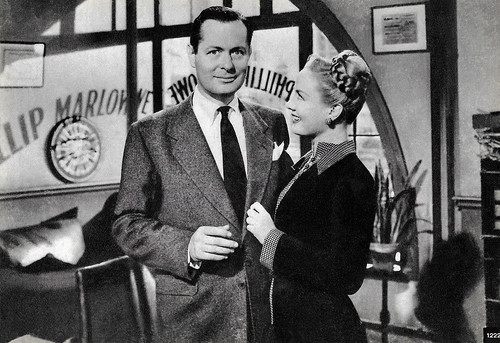
Italian postcard, no. 1222. Photo: Metro Goldwyn Mayer. Robert Montgomery and Audrey Totter in The Lady in the Lake (Robert Montgomery, 1947).
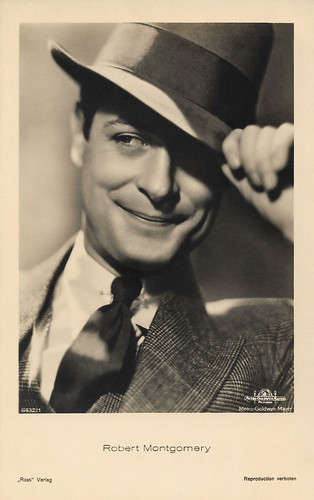
German postcard by Ross Verlag, no. 6432/1, 1931-1932. Photo: Metro-Goldwyn-Mayer.
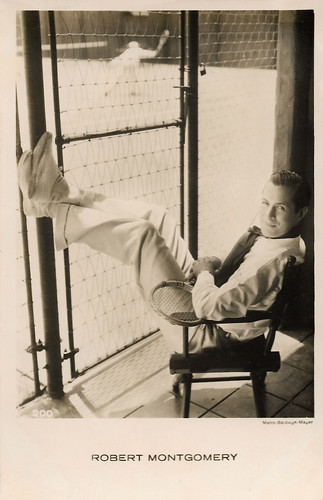
Dutch postcard, no. 200. Photo: Metro Goldwyn Mayer.
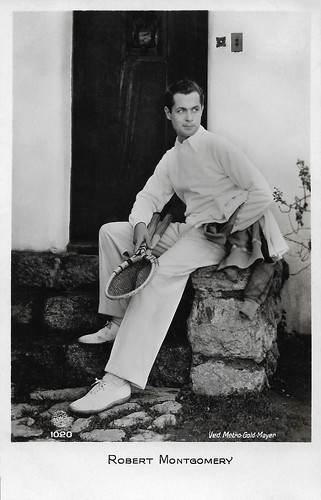
French postcard by EDUG, no. 1020. Photo: Metro Goldwyn Mayer.
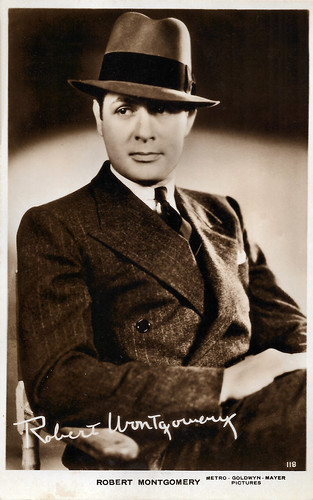
British postcard in the Film-Kurier Series, London, no. 118. Photo: Metro-Goldwyn-Mayer Pictures.
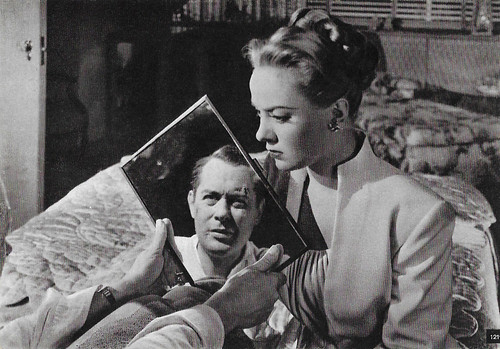
Italian postcard, no. 121. Photo: Metro Goldwyn Mayer. Audrey Totter and Robert Montgomery in The Lady in the Lake (Robert Montgomery, 1947).
Sources: Wikipedia (German, Spanish and English) and IMDb.
No comments:
Post a Comment